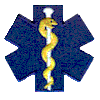|
Does "Brand Name" make a difference?
AHA, ECSI, ...
Which one?
Does the brand matter?
No. It really doesn't make a difference as far as the skills
go. CPR is CPR, First Aid is First Aid. Bloodborne
pathogens are nasty regardless of which company is providing the training.
All reputable companies (Brands) are based on the same "science" - the studies
that determine the best ways to provide emergency care. The skills
taught are essentially the same.
What should you look for?
-
Try to deal with a "local" (100 miles radius?) training agency - they are
familiar with your area, know the local requirements and can best determine
your needs.
Be careful of companies from several states away, or across the country or offering
ONLINE only class; and of companies who want FULL payment up
front (a small deposit is not unusual).
- NEVER use an "ONLINE" only training program - no regulatory ageny will accept
the credential. Blended/Hybrid (online lecture with IN-PERSON skills) is generally
accepted by all.
- Look at are the Instructor's qualifications, their experience, and ability
to teach
- Does the class provide adequate time for "hands-on" training?
-
Does the training company have have sufficient supplies and equipment for
the class size expected?
- Is the equipment in good/functional condition?
- Does the trainer propose realistic time frames for the class (you can't
teach a quality class in "under an hour")?
-
Look at the student manuals - Are they they provided by the "Brand" being taught - not
just some copied hand-outs? Do they provide the student with complete information - or
just an outline and a picture or two.
-
Look at the cost - it will vary by region, class size and content - but is
it realistic for what you are getting?
What is realistic? Consider a three (3) hour class, add about two and a half hours for
pre-class setup and post-class disinfection and cleanup, add another hour (or 2) for pre/
post class "office" time for paperwork, and don't forget travel time. The cost of
materials - even for a small class (student texts, Disposable lungs, cleaning supplies,
handouts, manikin wear-and-tear and more) can be substantial.
Ask yourself what your time is worth - What would you want to earn "per-hour" for this
three (3) (actually 7-8) hour class and then add the cost of materials and equipment - and
remember you need to make a profit!
-
Primarily, it is the instructor that makes the difference in class quality - if they
can't teach, and have no experience, all the videos, presentations, hand-outs and
books in the world won't make a difference.
When a question is asked, they must be able to answer it quickly and
correctly in terms the student understands
In general, if a recognized brand is used, the brand's materials
(books/credential) are provided and used, so it comes down to the class
instructor.
If the instructor is knowledgeable and adheres to the "Brand's" recommended timeframes
and content for the class, you will be well trained and ready to face an
emergency situation.
|


